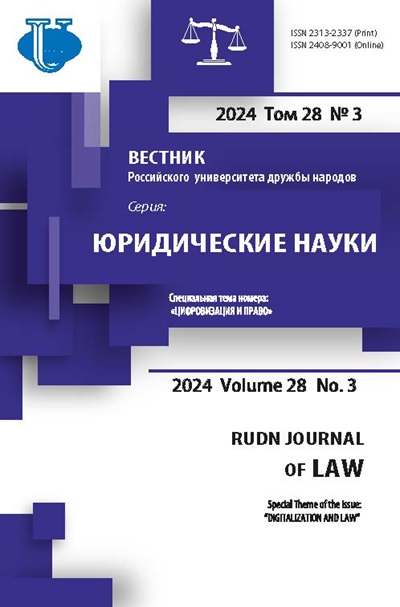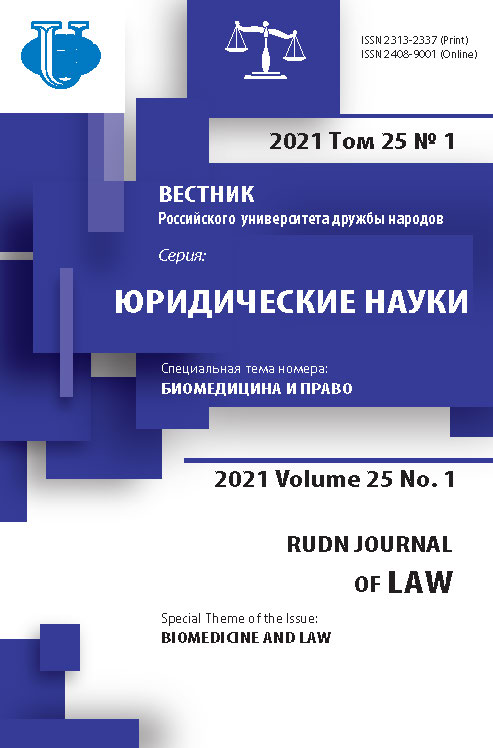Меры против Международного уголовного суда (США против МУС): перспектива международного права
- Авторы: Фахми В.1
-
Учреждения:
- Фаросский университет в Александрии
- Выпуск: Том 25, № 1 (2021): БИОМЕДИЦИНА И ПРАВО
- Страницы: 309-332
- Раздел: МЕЖДУНАРОДНОЕ ПРАВО
- URL: https://journals.rudn.ru/law/article/view/26050
- DOI: https://doi.org/10.22363/2313-2337-2021-25-1-309-332
Цитировать
Полный текст
Аннотация
С момента своего создания Международный уголовный суд столкнулся с отказом Соединенных Штатов сотрудничать. США, которые, помимо того, что остаются вне Римского статута, взяли на себя целевую стратегию ослабления своего Уголовного кодекса. Довод, выдвинутый правительством США против Римского статута, заключается в том, что международный договор не может создавать обязательства для государства, не являющегося участником, и поэтому Соединенные Штаты отрицают любую юрисдикцию в отношении своих граждан. Еще в 2000 году эта страна безуспешно внесла на рассмотрение Подготовительной комиссии предложение о недопущении передачи в Международный уголовный Суд (МУС) американского военного персонала. Закон о защите американских военнослужащих, двусторонние соглашения об иммунитете и резолюции Совета Безопасности представляют собой арсенал, используемый Соединенными Штатами в то время для нейтрализации МУС. Недавно Соединенные Штаты подписали приказ, разрешающий им препятствовать въезду в страну сотрудников Международного уголовного суда и наказывать их. Администрация США, которая в течение нескольких месяцев выступает с критикой Суда, возражает против начала расследования военных преступлений в Афганистане. Является ли это признаком сложностей, связанных с юридическим подходом к данному вопросу в США? Другими словами, открывает ли эта проблема возможность судебного преследования в случае нарушения международного права со стороны США?
Об авторах
Валид Фахми
Фаросский университет в Александрии
Автор, ответственный за переписку.
Email: walid.fahmy@pua.edu.eg
доцент кафедры публичного международного права факультета правовых исследований
Египет, г. Александрия, ул. Канал Эль МахмудиаСписок литературы
- Bassouini, M. (1996) International Crimes: Jus Cogens and Obligatio Erga Omnes. Law and Contemporary Problems. 59(4), 63-74
- Bava, J. & Ireland, K. (2016-2017) The American Service Members’ Protection Act: Pathways to, and Constraints on, U.S. Cooperation with the International Criminal Court'. Eye on the ICC. (12), 1-29. Available from: https://www-cdn.law.stanford.edu/wp-content/uploads/ 2016/07/Bava_Ireland_Article_FINAL.pdf [Accessed 12th November 2020]
- Benzing, M. (2004) U.S. Bilateral Non-Surrender Agreements and Article 98 of the Statute of the International Criminal Court: An Exercise in the Law of Treaties. Max Planck UNYB. 8(1),181-236. doi: 10.1163/138946304775159756
- Boller, T. (2003) The International Criminal Court: Better then Nuremberg? Indiana International & Comparative Law Review. 14(1), 279-314
- Chesterman, S. (2008) An International Rule of Law? The American Journal of Comparative Law. 56(2), 331-361
- Chet, J. (2004) The Proliferation of Bilateral Non-Surrender Agreements Among Non-Ratifiers of the Rome Statute of the International Criminal Court. American University International Law Review. 19(5), 1115-1180
- Cimiotta, E. (2016) The Relevance of Erga Omnes Obligations in Prosecuting International Crimes. Heidelberg Journal of International Law. 76(3), 687-713
- Curtis, B. & Goldsmith, J. (2017) Foreign Relations Law: Cases and Materials. Walters Kluwer
- Damien Massi Lombat, P. (2014) Les sources et fondements de l’obligation de coopérer avec la Cour pénale internationale. Revue québécoise de droit international / Quebec Journal of International Law / Revista quebequense de derecho internacional. 27 (1), 113-141. Doi.org/10.7202/1068048ar (in French)
- Dörr, O. & Schmalenbach, K. (2018) Article 31: General rule of interpretation. In: Dörr, O. & Schmalenbach, K. (eds). Vienna Convention on the Law of the Treaties: A commentary. Springer, Berlin, Heidelberg. pp. 587-588. doi: 10.1007/978-3-642-19291-3_34
- Edlin, D. (2006) The Anxiety of Sovereignty: Britain, The United States, and The International Criminal Court. Boston College International & Comparative Law Review. 29(1). Available from: https://lawdigitalcommons.bc.edu/iclr/vol29/iss1/2 [Accessed 10th November 2020]
- Elias, O. & Quast, A. (2003) The relationship between the Security Council and the International Criminal Court in the light of Resolution 1422 (2002). Non-State Actors and International Law. 3(2-3), 165-185. Doi: https://doi.org/10.1163/157180703322765049
- Faulhaber, L. (2003) American Service Members’ Protection Act of 2002. Harvard Journal on Legislation. (40), 537-557
- Franceschet, A. (2004) The Rule of Law, Inequality, and the International Criminal Court. Alternatives. 29(1), 23-42. doi: 10.1177/030437540402900102
- Frédérique, C. (2003) Sur un Etat tiers bien peu discret: les Etats-Unis confrontés au statut de la Cour pénale internationale. Annuaire français de droit international XLIX. CNRS Éditions, Paris. pp. 39-40. (in French)
- Garrod, M. (2018) Unraveling the Confused Relationship Between Treaty Obligations to Extradite or Prosecute and “Universal Jurisdiction” in the Light of the Habre Case. Harvard International Law Journal. 59(1), 125-196
- Grossman, M. (2004) American Foreign policy and the international Criminal Court in The International Criminal Court: Global Politics and the Quest for Justice. In: William J. Driscoll, Joseph P. Zompetti & Suzette Zompetti (eds.), International debate Association
- Heller, K.J. (2011) The Nuremberg Military Tribunals and the Origins of International Criminal Law. Oxford, Oxford University Press
- Jain, N. (2005) A Separate Law for Peacekeepers: The Clash between the Security Council and the International Criminal Court. European Journal of International Law. 16(2), 239-254. doi: 10.1093/ejil/chi116
- Jallow, H. (2009) Justice and the Rule of Law: A Global Perspective. The International Lawyer. 43(1), 77-81
- James, C. & Terry, P. (2013) The War on Terror: The Legal Dimension. Rowman & Littlefield Publishers
- Kreb, C. & Prost, K. (2015) Article 88. In: Triffterer, O. & Ambos, K. (eds) The Rome Statute of the International Criminal Court: A Commentary. Third Edition. Munich, Oxford, BadenBaden: C.H.Beck, Hart, Nomos
- Lawrence, F. (1989) The Nuremberg Principles: A Defense for Political Protester. Hastings law journal. 40(2), 397-436
- Lind, C. (2017) Article 98. In: Klamberg, M (eds.). A Commentary on the law of the International Criminal Court: A Commentary. Torkel Opsahl Academic EPublisher Brussels. pp. 663-668
- Mochochoko, P. (2001) The Agreement on Privileges and Immunities of the International Criminal Court. Fordham International Law Journal. 25(3), 638-664
- Pellet, A. (2009) La juridiction pénale internationale de Nuremberg à La Haye. Revue d’histoire de la Shoah. (156), 95. (in French)
- Sadat, L.N. & Drumbl, M.A. (2016) The United States and the International Criminal Court: A Complicated, Uneasy, Yet at Times Engaging Relationship. Washington University in St. Louis Legal Studies Research Paper Series
- Scharf, M. (2012) Universal Jurisdiction and the Crime of Aggression. Harvard International Law Journal. 53(2), 357-390
- Schöpfel, A. (2013) La voix des juges français dans les procès de Nuremberg et de Tokyo. Défense d'une idée de justice universelle. Guerres mondiales et conflits contemporains. 249(1), 101-114. Doi.org/10.3917/gmcc.249.0101 (in French)
- Shaghaji, D. (2015) L'obligation Erga Omnes d'extrader ou de poursuivre á l'encontre des crimes de Jus Cogens commis hors du territoire de l'Etat du for, Revue électronique de l’AIDP. Available from: http://www.penal.org/sites/default/files/files/A-4.pdf (in French)
- Stahn, C. (2003) The Ambiguities of Security Council Resolution 1422 (2002). European Journal of International law. 14(1), 85-104
- Stromseth, J. (2011) The International Criminal Court and Justice on the Ground. Arizone State Law Journal. (43), 427-445
- Trahan, J. (2013) The Relationship Between the International Criminal Court and the U.N. Security Council: Parameters and Best Practices. Criminal Law Forum. (24), 417-473. Doi.org/10.1007/s10609-013-9213-9
- Wexler, Leila Sadat (1996) The Proposed Permanent International Criminal Court: An Appraisal. Cornell international law journal. 29(3), 665-726
- Wind, M. (2009) Challenging sovereignty? The USA and the establishment of the International Criminal Court. Ethics & Global Politics. 2(2), 83-108
- Yanev, L. (2015) A Janus-Faced concept: Nuremberg law on conspiracy vis-à-vis the notion of joint criminal enterprise. Criminal Law Forum. (26), 419-456. Doi.org/10.1007/s10609-015-9262-3
















